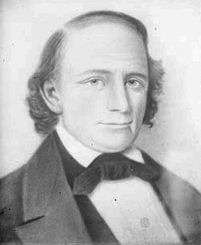Augustus Garrett
Augustus Garrett (1801 – November 30, 1848) was an American politician who twice served as Mayor of Chicago (1843–1844, 1845–1846). He was a member of the Democratic Party.
Augustus Garrett | |
|---|---|
 | |
| 7th and 9th Mayor of Chicago | |
| In office March 10, 1845[1] – March 3, 1846[2] | |
| Preceded by | Alson Sherman |
| Succeeded by | John Putnam Chapin |
| In office March 7, 1843[3] – April 2, 1844[4] | |
| Preceded by | Benjamin Wright Raymond |
| Succeeded by | Alson Sherman |
| Chicago Alderman from the 2nd Ward | |
| In office 1840–1841 | |
| Personal details | |
| Born | 1801 New York, United States |
| Died | November 30, 1848 (aged 46–47) Chicago, Illinois |
| Resting place | Rosehill Cemetery |
| Political party | Democratic Party |
| Spouse(s) | Eliza Clark |
| Residence | Chicago, Illinois |
Early life and career
Garrett married Eliza Clark in 1825 and moved to Chicago from New York in 1834. He had a small auction house near the Chicago River and by the following year had formed a partnership with the Brown Brothers, which allowed him to become a leading land speculator and auctioneer. By October 1836, he had sales of more than $1.8 million.
From 1840 through 1841, he served as Chicago alderman from the 2nd Ward.[5]
Mayoralties
In 1842, Garrett ran unsuccessfully for Mayor of Chicago. He ran again in 1843 and was elected.
In 1844, Garrett initially won re-election, only to have the election invalidated based on charges of "illegal proceedings and fraud."[6] Garrett ran in a second election that year, but lost to Alson Sherman.
Garrett was again elected mayor in 1845.
During his terms in office, Garrett pushed to have the first brick school in Chicago, Dearborn School, turned into either a warehouse or an insane asylum, believing that the building was too large for use as a school.[7]
Death and legacy

Augustus Garrett died at the Sherman House Hotel in Chicago on November 30, 1848 and was buried in Rosehill Cemetery.[8] Following his death, Eliza established the Garrett Bible Institute, now Garrett-Evangelical Theological Seminary, in nearby Evanston, Illinois.
References
- "Mayor Augustus Garrett Inaugural Address, 1845". www.chipublib.org. Chicago Public Library. Retrieved May 26, 2020.
- "Mayor John Putnam Chapin Biography". www.chipublib.org. Chicago Public Library. Retrieved May 26, 2020.
- "Mayor Augustus Garrett Inaugural Address, 1843". www.chipublib.org. Chicago Public Library. Retrieved May 26, 2020.
- "Mayor Alson Smith Sherman Biography". www.chipublib.org. Chicago Public Library. Retrieved May 26, 2020.
- "Centennial List of Mayors, City Clerks, City Attorneys, City Treasurers, and Aldermen, elected by the people of the city of Chicago, from the incorporation of the city on March 4, 1837 to March 4, 1937, arranged in alphabetical order, showing the years during which each official held office". Archived from the original on September 4, 2018. Retrieved December 24, 2018.
- Garrett, Augustus (March 7, 1844). "Inaugural Address of Mayor Augustus Garrett". Chicago Public Library. Retrieved June 5, 2012.
- Gale, Edwin O. (1902). Reminiscences of Early Chicago and Vicinity. Chicago: Revell. pp. 384.
- "Augustus Garrett". Buffalo Weekly Republic. December 19, 1848. p. 7. Retrieved April 4, 2020 – via Newspapers.com.
External links
| Wikimedia Commons has media related to Augustus Garrett. |